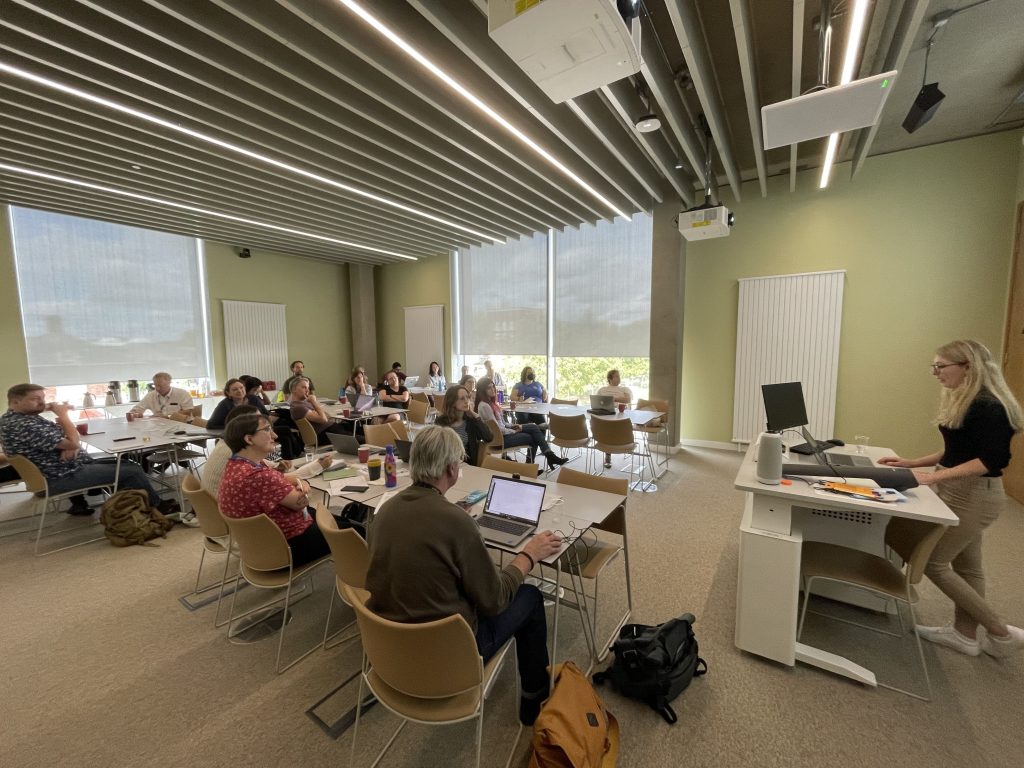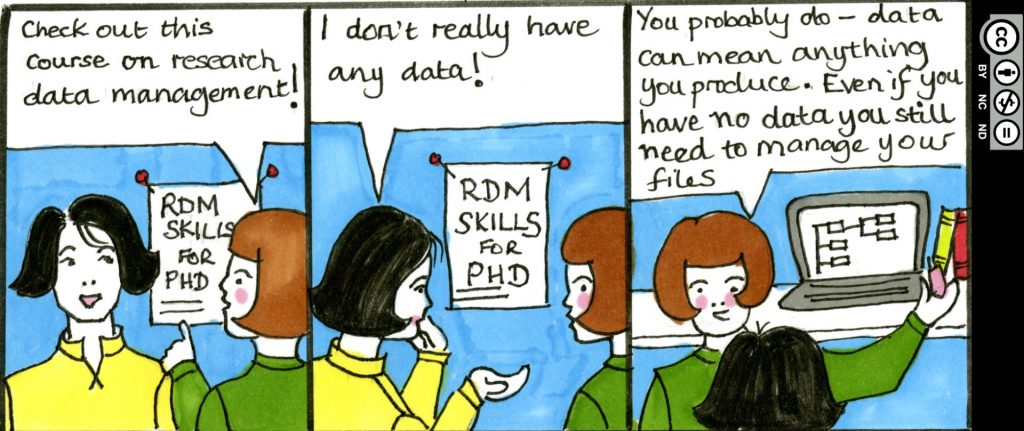Welcome back to the fourth instalment of Data Diversity, the podcast where we speak to Cambridge University Data Champions about their relationship with research data and highlight their unique data experiences and idiosyncrasies in their journeys as a researcher. In this edition, we speak to Data Champion Dr Stefania Merlo from the McDonald Institute of Archaeological Research, the Remote Sensing Digital Data Coordinator and project manager of the Mapping Africa’s Endangered Archaeological Sites and Monuments (MAEASaM) project and coordinator of the Metsemegologolo project. This is the first of a two-part series and in this first post, Stefania shares with us her experiences of working with research data and outputs that are part of heritage collections, and how her thoughts about research data and the role of the academic researcher have changed throughout her projects. She also shares her thoughts about what funders can do to ensure that research participants, and the data that they provide to researchers, can speak for themselves.

This is the first of a two-part series and in this first post, Stefania shares with us her experiences of working with research data and outputs that are part of heritage collections, and how her thoughts about research data and the role of the academic researcher have changed throughout her projects. She also shares her thoughts about what funders can do to ensure that research participants, and the data that they provide to researchers, can speak for themselves.
I’ve been thinking for a while about the etymology of the word data. Datum in Latin means ‘given’. Whereas when we are collecting data, we always say we’re “taking measurements”. Upon reflection, it has made me come to a realisation that we should approach data more as something that is given to us and we hold responsibility for, and something that is not ours, both in terms of ownership, but also because data can speak for itself and tell a story without our intervention – Dr Stefania Merlo
Data stories (whose story is it, anyway?)
LO: How do you use data to tell the story that you want to tell? To put it another way, as an archaeologist, what is the story you want to tell and how do you use data to tell that story?
SM: I am currently working on two quite different projects. One is Mapping Africa’s Endangered Archaeological Sites and Monuments (funded by Arcadia) which is funded to create an Open Access database of information on endangered archaeological sites and monuments in Africa. In the project, we define “endangered” very broadly because ultimately, all sites are endangered. We’re doing this with a number of collaborators and the objective is to create a database that is mainly going to be used by national authorities for heritage management. There’s a little bit less storytelling there, but it has more to do with intellectual property: who are the custodians of the sites and the custodians of the data? A lot of questions are asked about Open Access, which is something that the funders of the projects have requested, but something that our stakeholders have got a lot of issues with. The issues surround where the digital data will be stored because currently, it is stored in Cambridge temporarily. Ideally all our stakeholders would like to see it stored in a server in the African continent at the least, if not actually in their own country. There are a lot of questions around this.
The other project stems out of the work I’ve been doing in Southern Africa for almost the past 20 years, and is about asking how do you articulate knowledge of the African past that is not represented in history textbooks? This is a history that is rarely taught at university and is rarely discussed. How do you avail knowledge to publics that are not academic publics? That’s where the idea of creating a multimedia archive and a platform where digital representations of archaeological, archival, historical, and ethnographic data could be used to put together stories that are not the mainstream stories. It is a work in progress. The datasets that we deal with are very diverse because it is required to tell a history in a place and in periods for which we don’t have written sources.
It’s so mesmerizing and so different from what we do in contexts where history is written. It gives us the opportunity to put together so many diverse types of sources. From oral histories to missionary accounts with all the issues around colonial reports and representations of others as they were perceived at the time, putting together information on the past environment combining archaeological data. We have a collective of colleagues that work in universities and museums. Each performs different bits and pieces of research, and we are trying to see how we would put together these types of data sets. How much do we curate them to avail them to other audiences? We’ve used the concept of data curation very heavily, and we use it purposefully because there is an impression of the objectivity of data, and we know, especially as social scientists, that this just doesn’t exist.
I’ve been thinking for a while about the etymology of the word data. Datum in Latin means ‘given’. Whereas when we are collecting data, we always say we’re taking measurements. Upon reflection, it has made me come to a realisation that we should approach data more as something that is given to us and we hold responsibility for, and something that is not ours, both in terms of ownership, but also because data can speak for itself and tell a story without our intervention. That’s the kind of thinking surrounding data that we’ve been going through with the project. If data are given, our work is an act of restitution, and we should also acknowledge that we are curating it. We are picking and choosing what we’re putting together and in which format and framework. We are intervening a lot in the way these different records are represented so that they can be used by others to tell stories that are perhaps of more relevance to us.
So there’s a lot of work in this project that we’re doing about representation. We are explaining – not justifying but explaining – the choices that we have made in putting together information that we think could be useful to re-create histories and tell stories. The project will benefit us because we are telling our own stories using digital storytelling, and in particular story mapping, but it could become useful for others as resources that can be used to tell their own stories. It’s still a work in progress because we also work in low resourced environments. The way in which people can access digital repositories and then use online resources is very different in Botswana and in South Africa, which are the two countries where I mainly work with in this project. We also dedicate time into thinking how useful the digital platform will be for the audiences that we would like to get an engagement from.
The intended output is an archive that can be used in a digital storytelling platform. We have tried to narrow down our target audience to secondary school and early university students of history (and archaeology). We hope that the platform will eventually be used more widely, but we realised that we had to identify an audience to be able to prepare the materials. We have also realised that we need to give guidance on how to use such a platform so in the past year, we have worked with museums and learnt from museum education departments about using the museum as a space for teaching and learning, where some of these materials could become useful. Teachers and museum practitioners don’t have a lot of time to create their own teaching and learning materials, so we’re trying to create a way of engaging with practitioners and teachers in a way that doesn’t overburden them. For these reasons, there is more intervention that needs to come from our side into pre-packaging some of these curations, but we’re trying to do it in collaboration with them so that it’s not something that is solely produced by us academics. We want this to be something that is negotiated. As archaeologists and historians, we have an expertise on a particular part of African history that the communities that live in that space may not know about and cannot know because they were never told. They may have learned about the history of these spaces from their families and their communities, but they have learned only certain parts of the history of that land, whereas we can go much deeper into the past. So, the question becomes, how do you fill the gaps of knowledge, without imposing your own worldview? It needs to be negotiated but it’s a very difficult process to establish. There is a lot of trial and error, and we still don’t have an answer.
Negotiating communities and funders
LO: Have you ever had to navigate funders’ policies and stakeholder demands?
SM: These kinds of projects need to be long and they need continuous funding, but they have outputs that are not always necessarily valued by funding bodies. This brings to the fore what funding bodies are interested in – is it solely data production, as it is called, and then the writing up of certain academic content? Or can we start to acknowledge that there are other ways of creating and sharing knowledge? As we know, there has been a drive, especially with UK funding bodies, to acknowledge that there are different ways in which information and knowledge is produced and shared. There are alternative ways of knowledge production from artistic ones to creative ones and everything in between, but it’s still so difficult to account for the types of knowledge production that these projects may have. When I’m reporting on projects, I still find it cumbersome and difficult to represent these types of knowledge production. There’s so much more that you need to do to justify the output of alternative knowledge compared to traditional outputs. I think there needs to be change to make it easier for researchers that produce alternative forms of knowledge to justify it rather than more difficult than the mainstream.
One thing I would say is there’s a lot that we’ve learned with the (Mapping Africa’s Endangered Archaeological Sites and Monuments) project because there we engage directly with the custodians of the site and of the analog data. When they realise that the funders of the project expect to have this data openly accessible, then the questions come and the pushback comes, and it’s a pushback on a variety of different levels. The consequence is that basically we still haven’t been able to finalise our agreements with the custodians of the data. They trust us, so they have informed us that in the interim we can have the data as a project, but we haven’t been able to come to an agreement on what is going to happen to the data at the end of the project. In fact, the agreement at the moment is the data are not going to be going on a completely Open Access sphere. The negotiation now is about what they would be willing to make public, and what advantages they would have as a custodian of the data to make part, or all, of these data public.
This has created a disjuncture between what the funders thought they were doing. I’m sure they thought they were doing good by mandating that the data needs to be Open Access, but perhaps they didn’t consider that in other parts of the world, Open Access may not be desirable, or wanted, or acceptable, for a variety of very valid reasons. It’s a node that we still haven’t resolved and it makes me wonder: when funders are asking for Open Access, have they really thought about work outside of UK contexts with communities outside of the UK context? Have they considered these communities’ rights to data and their right to say, “we don’t want our data to be shared”? There’s a lot of work that has happened in North America in particular, because indigenous communities are the ones that put forward the concept of C.A.R.E., but in UK we are still very much discussing F.A.I.R. and not C.A.R.E.. I think the funders may have started thinking about it, but we’re not quite there. There is still this impression that Open Data and Open Access is a universal good without having considered that this may not be the case. It puts researchers that don’t work in UK or the Global North in an awkward position. This is definitely something that we are still grappling with very heavily. My hope is that this work is going to help highlight that when it comes to Open Access, there are no universals. We should revisit these policies in light of the fact that we are interacting with communities globally, not only those in some countries of the world. Who is Open Access for? Who does it benefit? Who wants it and who doesn’t want it, and for what reasons? These are questions that we need to keep asking ourselves.
LO: Have you been in a position where you had to push back on funders or Open Access requirements before?
Not necessarily a pushback, but our funders have funded a number of similar projects in South Asia, in Mongolia, in Nepal and the MENA region and we have come together as a collective to discuss issues around the ethics and the sustainability of the projects. We have engaged with representatives of our funders trying to explain that what they wanted initially, which is full Open Access, may not be practicable. In fact, there has already been a change in the terminology that is used by the funders. From Open Access, they changed the concept to Public Access, and they have come back to us to say that they can change their contractual terms to be more nuanced and acknowledge the fact that we are in negotiation with national stakeholders and other stakeholders about what should happen to the data. Some of this has been articulated in various meetings, but some of it was trial and error on our side. In other words, with our new proposal for renewal of funding, which was approved, we just included these nuances in the proposal and in our commitment and they were accepted. So in the course of the past four years, through lobbying of the funded projects, we have been able to bring nuance to the way in which the funders themselves think about Open Access.
Stay tuned for part two of this conversation where Stefania will share some of the challenges of managing research data that are located in different countries!



